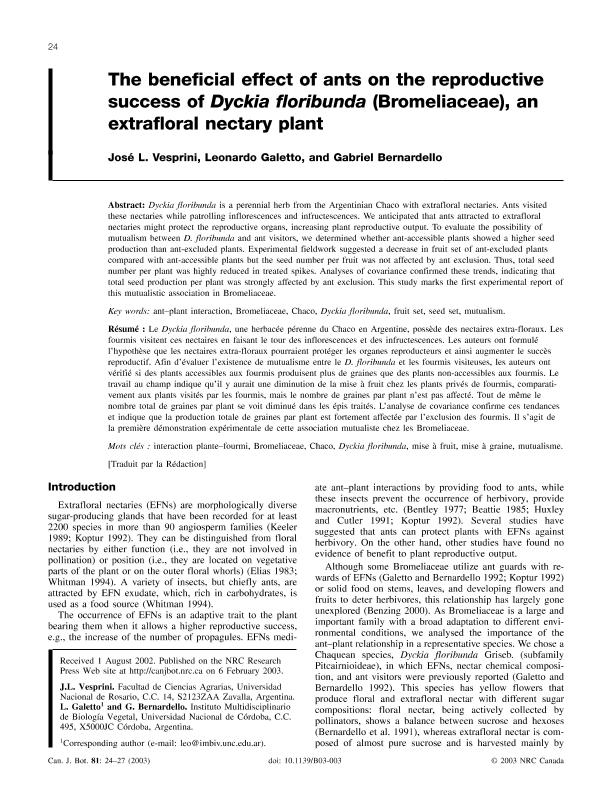Artículo
Dyckia floribunda is a perennial herb from the Argentinian Chaco with extrafloral nectaries. Ants visited these nectaries while patrolling inflorescences and infructescences. We anticipated that ants attracted to extrafloral nectaries might protect the reproductive organs, increasing plant reproductive output. To evaluate the possibility of mutualism between D. floribunda and ant visitors, we determined whether ant-accessible plants showed a higher seed production than ant-excluded plants. Experimental fieldwork suggested a decrease in fruit set of ant-excluded plants compared with ant-accessible plants but the seed number per fruit was not affected by ant exclusion. Thus, total seed number per plant was highly reduced in treated spikes. Analyses of covariance confirmed these trends, indicating that
total seed production per plant was strongly affected by ant exclusion. This study marks the first experimental report of this mutualistic association in Bromeliaceae. Le Dyckia floribunda, une herbacée pérenne du Chaco en Argentine, possède des nectaires extra-floraux. Les fourmis visitent ces nectaires en faisant le tour des inflorescences et des infructescences. Les auteurs ont formulé l’hypothèse que les nectaires extra-floraux pourraient protéger les organes reproducteurs et ainsi augmenter le succès reproductif. Afin d’évaluer l’existence de mutualisme entre le D. floribunda et les fourmis visiteuses, les auteurs ont vérifié si des plants accessibles aux fourmis produisent plus de graines que des plants non-accessibles aux fourmis. Le travail au champ indique qu’il y aurait une diminution de la mise à fruit chez les plants privés de fourmis, comparativement aux plants visités par les fourmis, mais le nombre de graines par plant n’est pas affecté. Tout de même le nombre total de graines par plant se voit diminué dans les épis traités. L’analyse de covariance confirme ces tendances et indique que la production totale de graines par plant est fortement affectée par l’exclusion des fourmis. Il s’agit de la première démonstration expérimentale de cette association mutualiste chez les Bromeliaceae.
The beneficial effect of ants on the reproductive success of Dyckia floribunda (Bromeliaceae), an extrafloral nectary plant
Fecha de publicación:
01/2003
Editorial:
National Research Council Canada-NRC Research Press
Revista:
Canadian Journal Of Botany
ISSN:
0008-4026
Idioma:
Inglés
Tipo de recurso:
Artículo publicado
Clasificación temática:
Resumen
Palabras clave:
Bromeliaceae
,
Chaco
,
Fruit Set
Archivos asociados
Licencia
Identificadores
Colecciones
Articulos(IMBIV)
Articulos de INST.MULTIDISCIPL.DE BIOLOGIA VEGETAL (P)
Articulos de INST.MULTIDISCIPL.DE BIOLOGIA VEGETAL (P)
Citación
Vesprini, Jose Luis; Galetto, Leonardo; Bernardello, Gabriel Luis Mario; The beneficial effect of ants on the reproductive success of Dyckia floribunda (Bromeliaceae), an extrafloral nectary plant; National Research Council Canada-NRC Research Press; Canadian Journal Of Botany; 81; 1; 1-2003; 24-27
Compartir
Altmétricas




